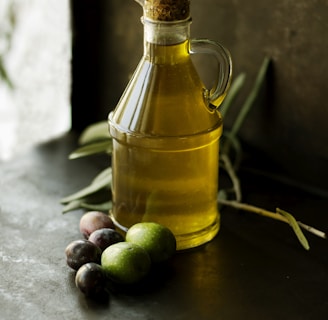Understanding the Difference Between Vegetable Glycerine and Propylene Glycol in Ayurvedic Products
AYURVEDIC HERBS- MAARBLE
6/17/20252 min read


Introduction to Vegetable Glycerine and Propylene Glycol
In the realm of skincare and haircare, the choice of ingredients plays a crucial role in determining the efficacy of products. Among these, two compounds frequently encountered are vegetable glycerine and propylene glycol. While both serve as humectants, the fundamental differences between them are significant, particularly in the context of Ayurvedic formulations.
Defining Their Roles in Skin and Hair Care
Vegetable glycerine, derived from plant oils, is known for its natural properties that promote moisture retention. It is often utilized in Ayurvedic skin and hair care products due to its gentle nature and compatibility with various skin types. On the other hand, propylene glycol is a synthetic compound frequently found in cosmetics and personal care items. Despite its widespread use, it may not align with the principles of Ayurvedic philosophy, which emphasizes natural and holistic ingredients.
Benefits of Vegetable Glycerine Over Propylene Glycol
One of the primary advantages of using vegetable glycerine over propylene glycol in Ayurvedic products is its superior moisturizing ability. Glycerine not only attracts moisture but also maintains skin hydration, leading to improved elasticity and overall skin health. Additionally, vegetable glycerine is less likely to cause irritation or allergic reactions, making it an ideal option for sensitive skin types.
Moreover, in the context of Ayurvedic principles, products containing vegetable glycerine align better with the values of gentleness and purity. Many practitioners of Ayurveda recommend using natural ingredients to nourish and rejuvenate the skin and hair. Vegetable glycerine, being plant-based, is a fitting candidate as it embodies these ideals.
Furthermore, vegetable glycerine has been recognized for its ability to enhance the effectiveness of other ingredients. This synergy fosters a more comprehensive approach to skincare, allowing herbal extracts and oils to penetrate deeper into the skin, thereby maximizing their benefits.
In contrast, while propylene glycol can promote hydration, its synthetic nature raises concerns for those seeking to avoid chemically derived substances in their beauty regime. The preference among many Ayurvedic practitioners and brands, such as Maarble Organics, lies in leveraging the natural virtues of vegetable glycerine, ensuring that the products not only deliver results but also adhere to the holistic philosophies of Ayurveda.
In summary, when considering the integration of humectants in skin and hair care products, vegetable glycerine stands out as a preferable choice over propylene glycol. Its natural origins, complemented by its moisturizing benefits and alignment with traditional Ayurvedic practices, render it an excellent component in formulations designed to nurture the skin and hair.
Ultimately, understanding the basic differences between vegetable glycerine and propylene glycol can empower consumers to make informed choices about their skincare and haircare products, especially when seeking to incorporate Ayurvedic principles into their routines.


